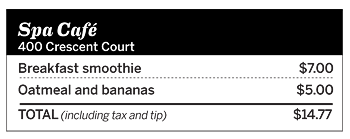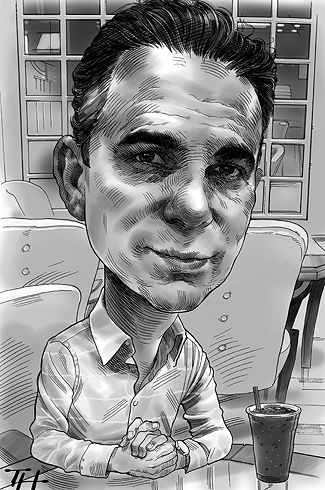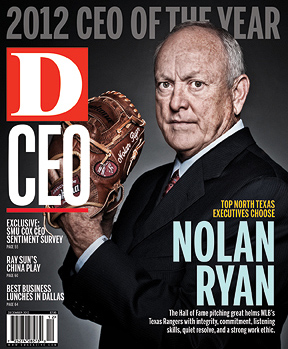In the sub-basement below the Rosewood Crescent Hotel I find my way to a small café adjacent to the Spa at the Crescent. (Appropriately enough, it’s called the Spa Café.) When I arrive, at 9 a.m. on a Tuesday, there’s no one around. No one behind the counter, and no one near any of the tables in the cubby-hole of a dining space.
Real estate investor David Weinreb had asked me to meet him at the spa’s “juice bar,” so I worry that maybe this isn’t the right spot after all. But before I can turn to find somebody to ask, he arrives.
He looks freshly showered and relaxed, with the top couple buttons of his white shirt undone. He gestures to one of the tables and we sit for the next segment of his morning ritual. When he’s not out of town on business, Weinreb works out at the Crescent five or six times a week. Then he partakes of his routine breakfast, a shake that through experimentation he’s designed to suit his tastes. Often he just whips it up for himself at home. It’s a blend of strawberries, blueberries, raspberries, protein powder, and a “heaping scoop” of crunchy peanut butter.
“It’s the best thing you’ve ever tasted,” he says. “It’s fantastic. It tastes like a peanut butter-jelly sandwich without the bread.”
A spa staff member suddenly appears to take our orders. “I’ll have my shake,” is all that Weinreb has to say. I quickly glance at the menu and order a bowl of oatmeal with bananas.
“Have you always been health-conscious?” I ask after he details his weekly exercise regimen—running several miles each day on the treadmill, biking around White Rock Lake on the weekends.
“I’ve got a friend, he’s got a great expression: ‘You’ve got to be combat-ready,’” Weinreb says. “You need to be ready for the day. I work 12 to 14 hours a day. I find working out gives me a lot of extra energy.”
I can understand why he’s interested in maximizing his energy reserves. After 17 years of running his own show as head of TMPC Realty Corp., Weinreb decided to take the reins of a new public company spun off from the bankrupt General Growth Properties in 2010. In doing so, he committed himself to build from scratch a new institutional structure to oversee a portfolio of 34 prime real estate assets in
18 states.
He says he’s on the road 18-20 days out of every month, far more than he had to be for his former gig. Why’d he sign up for all that? “I liken it to if you dreamed of ever owning a Picasso in your life and then someone comes to you and says you can own a collection of Picassos,” he says.
As Weinreb describes it, the Howard Hughes Corp. owns some of the nation’s most highly regarded commercial developments and masterplanned communities. These include the South Street Seaport in New York, the Woodlands outside Houston, and the Summerlin development near Las Vegas. It’s a collection of properties that it would have been unfathomable to consider acquiring if General Growth Properties hadn’t already controlled them and bequeathed them to HHC.

Weinreb’s much-heralded shake arrives about five minutes before my oatmeal. He courteously waits until I have my food before feeding himself. The bowl I’m served is large, and I only manage to get halfway through it before giving up. I realize I should perhaps have given his shake a try instead.
The sound of blenders mixing up smoothies at the juice counter continues to remind me of my error in ordering, as Weinreb explains why he settled on naming the new company after Howard Hughes, the iconoclastic businessman. One of the properties they own had retained the rights to his name.
“We felt like it was a great opportunity to build on his legacy. And, obviously, several of our core assets are assets that he owned. He had the brilliance, long before it was fashionable to do it, to accumulate land,” he says.
The company views the Hughes name as an asset in and of itself, one that they might consider using in some business outside their core real estate investments at some point.
“You’re not going to start an airline?” I ask jokingly, as if speculating that a revival of Hughes Aircraft may be in the offing.
Weinreb smiles, but doesn’t exactly deny it: “You never know.”






